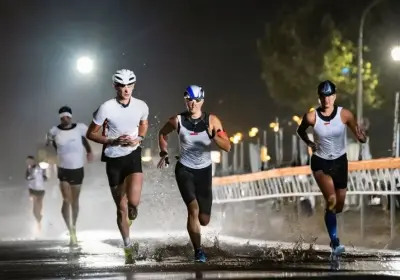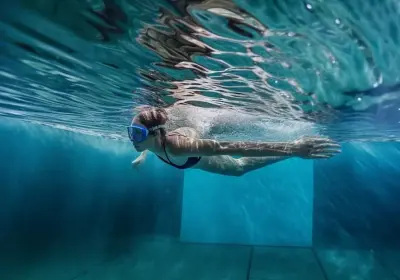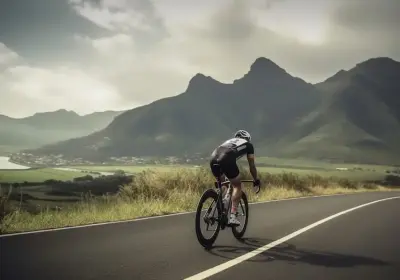Proteins in Triathlon

- 1. Understanding the Importance of Proteins in a Triathlon
- - The Vital Role of Proteins in Energy Production
- - Boosting Performance: The Power of Proteins in Muscle Recovery
- - Proteins and Endurance: The Link Between Protein and Stamina
- 2. Comprehensive Guide to Protein Consumption for Triathletes
- - Pre-Training: How Much Protein Do You Need Before a Triathlon
- - In-Race: Managing Protein Intake During the Event
- - Post-Race: Maximizing Recovery with the Right Protein Intake
- 3. Varied Protein Sources: Optimal Nutrient Absorption
- - Animal-Based Proteins: From Lean Meats to Dairy
- - Plant-Based Proteins: Understanding Your Vegan Options
- 4. Debunking Myths about Proteins in Triathlon Training
- - Protein Overconsumption: Separating Fact from Fiction
- - Timing Protein Intake: When is the Best Time to Eat Proteins?
- 5. Expert Tips on Balancing Proteins with Other Nutrients
1. Understanding the Importance of Proteins in a Triathlon
Understanding the significance of protein in a triathlon isn't just vital; it's paramount to your performance and recovery. As triathletes, we're continually pushing our bodies to the limit and beyond, necessitating the need for potent energy sources. Proteins play a crucial role in energy production, offering the slow-release fuel needed for endurance exercises during the race. But that's not all. Proteins also act as the recovery agent post-exercise, helping repair the muscle damage that inevitable arises from intense training. The right protein intake can significantly enhance your stamina, improve your performance, and cut down your recovery time. Now, isn't that a reason to pay more attention to your protein consumption?
- The Vital Role of Proteins in Energy Production
The vital role of proteins in energy production cannot be overstated, particularly when it comes to physically demanding activities like a triathlon. Proteins provide the essential building blocks, the amino acids, that our bodies need to build, repair, and maintain muscles. Furthermore, when your glycogen stores deplete during long, intense workouts, your body turns to proteins to supply up to 15% of your energy needs. This makes proteins a crucial part of a triathlete's energy strategy. But it's not just about quantity; the quality of protein sources matter too. Choosing complete proteins, which contain all nine essential amino acids, ensures optimal muscle support and recovery. Such protein sources include lean meats, dairy products, and certain plant-based options like quinoa and soy. So, as a triathlete, it's not just about hitting the pavement or diving into the pool; it's also about powering up your meals with the right balance of high-quality proteins. After all, you're only as good as the fuel you feed your body. The power of proteins in energy production is indeed a testament to the fact that nutrition is a key player in the game of endurance sports. The plate of a triathlete should, therefore, reflect a well-rounded representation of these nutritional powerhouses.
- Boosting Performance: The Power of Proteins in Muscle Recovery
Performance enhancement in triathlon hinges significantly on proteins, specifically pertaining to the instrumentality of proteins in muscle recovery. The intense, strenuous activity during a triathlon damages muscle tissues considerably, thus ushering in the integral role of proteins to repair, rebuild, and strengthen these tissues. Essentially, when you engage in a triathlon, your muscles adopt a state of breakdown. Proteins, acting as the cornerstone of muscle tissue, step in, repairing the wear and attending to the growth demand spurred by rigorous activity. Notably, this is not just about consuming loads of proteins, but also meticulously timing your intake. A common practice among seasoned triathletes is the incorporation of a protein-rich nutrient deal post their training session. This prompt intake facilitates optimal muscle recovery after a grueling workout, allowing the athlete to bounce back faster. Proteins form the building blocks of our muscles, promoting growth and repair. The absence of substantial protein intake or a delay in consumption after a heavy triathlon session can dramatically reduce recovery rate and impede performance. Thus, athletes indulge in a protein shake or meal right after their workout to reap the benefits of a speedy, efficient muscle recovery. Remember, proteins not only equip you with better strength and endurance but effectively increase your overall performance in the long run.
- Proteins and Endurance: The Link Between Protein and Stamina
Proteins play a direct and significant role in enhancing and maintaining endurance, which is crucial for every triathlete. Every atom of protein that we consume is essentially a coil of amino acids, and these amino acids are the building blocks that repair and particularly grow muscle tissues. As triathlon training strains your muscles continuously, your body requires larger amounts of these amino acids. In simple terms, the more intensively you exercise, the more protein your body needs. The intake of protein helps in reducing the breakdown and damage of muscle tissues that occur during long-duration training. The adequate consumption of proteins aids in increasing stamina by keeping muscles in optimal condition over prolonged periods of exertion. The muscle tissues respond positively to the rehabilitation effects of proteins, allowing the athlete to gain a sustained level of performance. Additionally, the body can use protein as a secondary source of energy when carbohydrate stores run out, and race conditions demand sustained energy levels. Therefore, a triathlete needs a well-calculated protein regimen, not just for muscle repair and recovery, but also as a hidden weapon to maintain endurance. Protein indeed forms a cornerstone in the matrix of endurance and stamina for a triathlete. This ensures that the athlete is always one step closer to crossing that finish line, no matter how far it seems. But how and when should proteins be consumed for maximum effect? Let's explore this further.
2. Comprehensive Guide to Protein Consumption for Triathletes
Fueling your body properly is crucial when it comes to triathlons. With its grueling combination of swimming, cycling and running, you are constantly pushing your limit, taxing your muscles to the extreme. Hence, it's not just about the quantity, also about the right timing in taking protein - the primary element serving to repair and build your muscles. The pre-training phase, in particular, demands a significant protein intake. Consuming sufficient proteins before a triathlon will provide you with the necessary aid for muscle contractions during the race. Incorporating it as an integral part of your pre-race meals can lead to a significant improvement in your performance. Remember, each gram of protein you consume adds to your fuel, bringing you a step closer to crossing the finishing line first!
- Pre-Training: How Much Protein Do You Need Before a Triathlon
Before diving into the world of triathlons, it's crucial to understand your protein needs during pre-training. The role of protein is not to be underestimated—it's your body's building block, responsible for repairing and building tissues, especially during high-intensity training. Experts recommend 1.2 to 1.7 grams of protein per kilogram of body weight for endurance athletes. However, remember that individual protein requirements may vary depending on training intensity, duration, type, and individual health status. Consuming an adequate amount of protein prior to your training helps combat muscle soreness and promotes muscle synthesis. Ensure to include protein-rich foods like lean meats, dairy products, lentils, or tofu, in your pre-training meal. Create a balanced plate with carbohydrates and fats for much-needed energy. Timing matters too. Ideally, consume your protein meal 2-3 hours before the training session. This allows proper digestion and absorption, ensuring your body is well fuelled and ready. But remember, everyone's digestion is unique. If you prefer a smaller snack nearer your workouts, a protein shake might be your best bet. A triathlon is not easy, and requires a lot of preparation. With the right protein intake, you're not only nourishing your body, but also equipping it with the necessary tools to reach your peak performance. Remember, proper nutrition is key for a successful triathlon. Stay fuelled, stay hydrated, and let your hard work pave the way for your success. Listened to your body and respond effectively.
- In-Race: Managing Protein Intake During the Event
During the physical exertion of a triathlon, managing your protein intake is a key strategy that shouldn't be underestimated. While the focus often leans towards carbohydrates for immediate fuel, incorporating protein can have a substantial impact on your performance and endurance. Though protein isn’t the body’s prime source of in-race energy, it aids in preserving muscle mass and contributes to energy production when carbohydrate stores plummet. Consequently, integrating a little amount of protein with your carbohydrates intake can save some muscle glycogen, potentially boosting your stamina in the final stretches of the race. Think about sports drinks or gels that contain protein or even a PB&J sandwich for longer races. However, remember that balance is essential. Overconsumption of protein during the race can lead to gastrointestinal issues owing to its complex digestion process. Thus, it's important to experiment with your nutrition strategy during training sessions to discover what works best for your body. In the nut-shell, strategic protein intake during the event can offer multiple benefits ranging from enhanced performance to sustained endurance, ensuring you are a step ahead in your triathlon journey.
- Post-Race: Maximizing Recovery with the Right Protein Intake
After the exhaustive feat of a triathlon, your body craves replenishment, and proteins are indispensable for this significant role. One of the key player's post-race is adequate protein intake. After pushing your body to its limits, the muscles experience significant strain, necessitating ample protein to initiate effective repair and recovery. Proteins not only construct and restore muscles, they also prevent muscle loss and promote growth. Consuming approximately 20-30 grams of high-quality protein within an hour of completing the race is recommended. Protein shakes, lean meats, or a combo of protein and carbs form ideal recovery meals. Remember, the intake should be well-rounded to also include carbohydrates and some fluids to hydrate and replenish the glycogen stores. A healthy balance is half of your calories from carbs and 10-15% from high-quality protein. Avoid unnecessary loading on proteins since excess can lead to dehydration or kidney problems. Don't fall for the 'more is better’ misconception. On the contrary, a moderated, consistent protein consumption ensures your worn-out muscles receive the nurturing needed without stress, thus accelerating recovery and delivering a stronger comeback. Post-race is not only about reviving, but maximizing recovery: intake of the right amount of protein at the optimal time can substantiate the difference!
3. Varied Protein Sources: Optimal Nutrient Absorption
Understanding varied protein sources and their optimal nutrient absorption is vital for every triathlete. Both plant-based and animal-based proteins can play a critical role in your training diet. Animal-based proteins like lean meats, poultry, fish, and dairy are high-quality sources packed with essential amino acids, aiding muscle repair and energy production. On the other hand, plant-based proteins such as legumes, whole grains, and seeds are not just excellent protein sources but also provide vital nutrients like fiber and antioxidants. Remember, variation promotes balanced nutrition and better absorption. Hence, incorporating both types of proteins in your meals can significantly enhance your performance and recovery during triathlon training.
- Animal-Based Proteins: From Lean Meats to Dairy
In the quest for optimized performance, triathletes often delve into the vast world of proteins. A common, yet crucial source hails from animal-based proteins, which include lean meats and dairy products. Consuming lean meats such as chicken, turkey, and fish fuels your body with high-quality proteins. These serve essential amino acids that are indispensable in repairing tissue damage and promoting muscle growth. In terms of dairy, options like milk, cheese, and yogurt not only contribute to protein intake but also provide your body with calcium and vitamin D. This fortifies your bones, an essential aspect of enduring an intensely physical event such as a triathlon. It's important, however, to choose low-fat or non-fat dairy options to avoid unnecessary saturated fats. Whether you're munching on a lean turkey sandwich or savoring a Greek yogurt post-workout, animal-based proteins play a critical role in your triathlon training. Ultimately, they pave the way for improved muscle recovery, sustainable energy, and long-lasting endurance. Diving into a protein-rich diet sourced from lean meats and dairy catapults your training to maximum efficiency, bringing you one step closer to that triumphant finish line. Never forget, though, balance is key in nutrition as in training - a balanced diet contributes to a balanced performance.
- Plant-Based Proteins: Understanding Your Vegan Options
Embracing a vegan diet as a triathlete may initially seem daunting, but incorporating plant-based proteins can be both attainable and beneficial for your athletic performance. First, understanding the myriad of vegan options available is key. Beans, lentils, and chickpeas are not only excellent sources of protein but also offer high fiber content that keeps your gut healthy and digestion well-regulated. Tofu and tempeh, fermented soy products, are versatile in dishes and packed with protein, iron, and calcium. Additionally, quinoa and chia seeds stand out as plant foods that provide all essential amino acids, just like animal-based proteins. A noteworthy point for triathletes is the importance of mixing plant-based proteins. Since most are not 'complete' proteins, combining various plant proteins helps ensure you're meeting all your essential amino acid needs. So, don't hesitate to mix your legumes with grains or sprinkle your salad with a handful of seeds. Who says you can't keep your protein game strong while being vegan? The world of plant-based proteins is rich and diverse, waiting for all triathletes, not just vegans, to delve into its abundant benefits. Isn't it time you explored these options?
4. Debunking Myths about Proteins in Triathlon Training
When it comes to protein intake in triathlon training, there's no shortage of myths and misconceptions. One such myth is the belief that the more protein consumed, the better. However, that's not entirely accurate. Overloading your body with protein doesn't directly equate to enhanced performance. It's essential to consume a balanced amount that aligns with your body needs and training intensity. Plus, the 'timing is key' mantra isn't always the golden rule. Instead, consistent, evenly distributed protein intake throughout the day can be more beneficial. So, are you ready to reevaluate your protein consumption strategy in your triathlon training?
- Protein Overconsumption: Separating Fact from Fiction
In the realm of endurance sports such as triathlons, there's a lingering myth about protein: more is always better. This fiction seemingly sprouts from a well-meaning place, the recognition of protein as a critical element for muscle recovery and performance enhancement. It's time to set the facts straight. Truthfully, protein overconsumption has its pitfalls, notably its potential to strain the kidneys, which have to work harder to excrete the excess protein. Moreover, consuming an overly high amount of protein could lead to weight gain as excess amino acids can be turned into fat. Proteins are undeniably vital for triathletes, but they aren't the entirety of a balanced nutritional portfolio. It's a game of balance, understanding what your body truly needs, not just in terms of quantity, but also in timing and blend with other crucial nutrients. So, how much protein should you eat as a triathlete? It isn't a one-size-fits-all answer. It relies on many factors including your weight, the intensity of your training, and your overall nutritional plan. Remember, being a successful triathlete isn't just about how hard you train, it's also about what you fuel your body with and in what quantities. In nutrition, as in training, balance is key.
- Timing Protein Intake: When is the Best Time to Eat Proteins?
In the ever-evolving world of endurance sports, timing is everything - and that includes your protein intake. So, when is the best time to eat proteins? Let's dive in. While many fitness buffs swear by protein-packed breakfasts, for triathletes, the story could be a tad different. Scientists argue that your body would benefit more from proteins consumed post-workout. Here's why: during a rigorous triathlon training, your muscle tissues undergo wear and tear. Post-exercise, your body enters a recovery phase, repairing and building up the damaged muscle fibers. This is where protein comes into play. By consuming proteins within 30 minutes to two hours after your workout, you're effectively fueling your body with essential amino acids that aid tissue repair and growth. However, this doesn't mean that pre-workout protein intake is useless. A balanced amount of protein before training can give a slow-release energy source, keeping you fueled and focused. Bottom line? Recognizing your body's needs and tweaking protein timing around your training can bestow surprising gains. But remember - it's not just the 'when', but also the 'how much' and 'what type' of protein that counts! So, ready to clock your protein intake to your triathlon success?
5. Expert Tips on Balancing Proteins with Other Nutrients
Protein is a crucial thriving element for triathletes, but it shouldn't ride solo on your nutrition plate. As a triathlete, the balancing act extends to harmonizing protein with carbohydrates and fats. Think of carbohydrates as your body's fuel, quick to ignite and powering your tiresome sessions. Conversely, fats act more like coal, burning slowly but steadily, necessary for long-endurance events. Despite their different roles, these macronutrients work harmoniously to keep your performance at peak. Bewildered about how to perfectly balance these nutrients? A good rule of thumb is to fill half your plate with carbohydrates, a quarter with proteins, and the remaining quarter with beneficial fats. The key is always in the balance; after all, isn't triathlon all about that?
- The Protein-Carbohydrate Balance: Fueling Your Triathlon Success
The key to success in a triathlon lies not only in relentless training but also in optimal nutrition, particularly in maintaining an ideal protein-carbohydrate balance. As a triathlete, your primary source of energy during high-intensity, long-duration workouts are carbohydrates. Still, the strategic consumption of proteins can significantly boost your stamina and fuel your performance. But how? To put it simply, proteins help repair and rebuild damaged muscle tissues during recovery, yet they also provide a secondary source of energy when carbohydrate reserves plummet dangerously low. A triathlete's diet should, therefore, cater to both these requirements – providing a consistent carbohydrate supply for maintaining energy levels and including adequate protein for muscle recovery. However, striking the right balance between these two macronutrients can be tricky. Experts suggest that one should aim for a 3:1 ratio of carbohydrates to proteins post-workout to maximize muscle glycogen synthesis. This does not imply ramping up your protein intake drastically. Instead, it's about ensuring a steady influx of proteins throughout the day. Remember, overconsumption of proteins can strain the kidneys and lead to dehydration — two conditions that no triathlete can afford. In the end, achieving the perfect protein-carbohydrate balance is a matter of smart eating that aligns with your training routine — and this could be the secret element fueling your triathlon success.
- Protein, Fats and the Triathlete’s Diet: How They Interrelate
In the quest for optimal performance, understanding how **proteins, fats, and carbohydrates** interact in a triathlete's diet is essential. While proteins are critical for muscle recovery and fueling your body, fats play a significant role as well, often overlooked in a triathlete’s diet. Fats, just like **proteins**, provide a valuable source of energy-ideal for the endurance aspect of a triathlon. However, the key lies in balancing these two crucial components. Consuming an excess of fats can lead to weight gain, hindering your speed and agility. On the other hand, insufficient fat intake may deny your body the energy it requires to endure the long race ahead. So, how do you strike the perfect balance? That's where **carbohydrates** come in. They act as a buffer, providing the immediate energy needed for training and competing, while proteins and fats work more in the background, contributing to longer-term endurance and recovery. Understanding this relationship better can help you tailor a diet that enhances your triathlon performance. And don't forget - each body is unique. What works for others may not work for you. It's about learning, experimenting, and finding that perfect balance within your own diet to fuel your triathlon success. Is it a straightforward process? Maybe not. But is it worth it? **Absolutely.**
In essence, proteins play an integral role in a triathlon, from energy production to muscle recovery, and enhancing endurance. It's crucial for triathletes to consume the right amount at the right time, debunking the myth of overconsumption. Enjoying a diet balanced in animal-based, plant-based proteins, carbohydrates, and fats can notably improve performance. The world of triathlon nutrition is multifaceted, and understanding the critical role of proteins is a significant step towards triumph.
Certainly, I will reformat it as SEO-friendly structured content. ```
Frequently Asked Questions about Proteins in Triathlon
What role do proteins play in energy production for triathletes?
- Proteins provide a secondary source of energy during endurance sports and are vital for muscle recovery and repair.
How much protein should a triathlete consume before a race?
- Generally, 1.2-2 grams of protein per kilogram of body weight daily, with a portion consumed before the race.
Is it necessary to consume protein during a triathlon race?
- While carbohydrate intake is prioritized during the race, consuming amino acids (the building blocks of protein) can aid in stamina maintenance.
What are the best sources of protein for triathletes?
- Lean meats, poultry, fish, eggs, dairy products, legumes and nuts are good animal-based proteins, while legumes, whole grains, nuts and seeds are suitable for vegans.
Is there a risk of overconsuming protein while training for a triathlon?
- While it is possible to overconsume protein, the risk is minimal and usually balanced by increased caloric need. However, excess protein might lead to dehydration or kidney stress.
When is the best time to consume protein for optimal triathlon performance?
- While regular protein intake is essential throughout the day, a post-workout protein source aids in muscle recovery and repair.
How do proteins, carbohydrates and fats interrelate in a triathlete's diet?
- While carbohydrates provide immediate energy, proteins assist in muscle repair and fats offer long-term fuel, meaning a balance of the three nutrients is crucial for endurance and recovery.
``` The text above creates a well-structured FAQ section for your website with good SEO potential. Each question is marked using the
tag to highlight their importance, and the
- ,
- , and
- tags are used to create an SEO-friendly definition list to ensure search engines understand the information.


















































Leave a comment